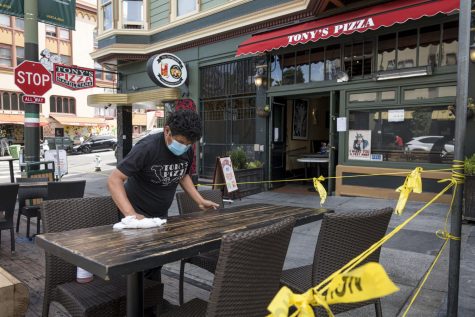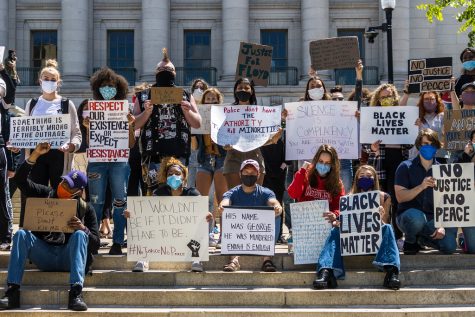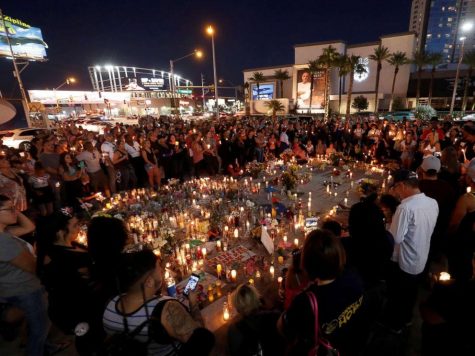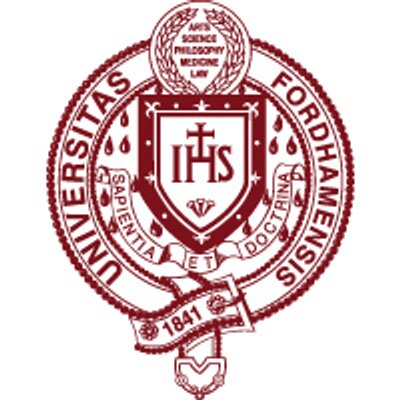SAGES Demonstrates Lack of Understanding of Catholic Doctrine
SAGES members speak to students about their agenda and goals meant to improve student access to certain services. Kellyn Simpkins/The Ram
November 19, 2014

By MaryKate Glenn
I am a feminist. I practice safe sex, despite my admittedly lackluster Catholic high school sex-ed curriculum. I take birth control daily. I reject the existence of the concept of “slut.” I think it is admirable and necessary that groups of students are promoting conversations about the sexual harassment and rape culture that is all-too present on this campus. I am proud of my own sexual empowerment. However, I cannot support the Students for Sex and Gender Equality and Safety (SAGES) campaign and its partners.
SAGES has received substantial amounts of attention and press in the last month or so. I have immense respect for the efforts of the students who champion this cause. Their work is extensive and widely heard of, and they are incredibly well organized. I am continually impressed by how this campaign has demonstrated the reach and impact that an entirely student run movement can affect.
That being said, there is an elephant in the room. I watch the SAGES movement get larger. I read articles about SAGES in The Ram and the paper. I follow the SAGES Tumblr and Twitter accounts. I look at the flyers they hand me. I ask myself how everyone is ignoring the elephant. This issue is black and white. There are no gray areas, no ifs or buts, no justifiable arguments as to why it is reasonable that anyone would think Fordham could provide birth control and promote a sexually active campus community. How has this fact been so ignored for so long?
Fordham University, the Jesuit University of New York, is a Catholic institution. Every single student at our school chose to apply to and to attend a Catholic institution. We all signed up for this. And, the Catholic Church’s position on contraception is no secret. Unless you literally lived under a rock before you came here, it is an indefensible argument to maintain that any one of us was unaware of the Church’s stance before coming to Fordham. Catholicism unequivocally rejects anything that is intrinsically preventative to the conception of a child, whether that is the intended use of contraception or not.
To maintain its status as a Catholic university, Fordham must adhere to such fundamental tenets of the religion it advertises. Recent history evidences the fact that the Church is far from lenient when it comes to Catholics and Catholic institutions who choose to defy or ignore its basic principles. A prime example occurred back in 2009, when then-Sister Margaret McBride approved the abortion of an 11-week old fetus at a Catholic hospital due to the severe endangerment of the mother’s life. Once this came to the attention of the Catholic diocese in Phoenix, Margaret McBride was automatically excommunicated and the diocese ultimately severed all affiliation with the hospital. In other words, Catholic teaching is non-negotiable. The Catholic Church does not make exceptions — not even for one of the most liberal and influential Catholic universities in the United States.
Keeping that in mind, perhaps SAGES could refocus its attention and its message to achieve more realistic, reasonable goals. Having women’s health specialists on campus is inarguably SAGES’ most reasonable demand — and it is an important one. Fordham cannot use its Catholic identity to refuse this request.
Why don’t we have a resident gynecologist at a school where the majority of the students are female? Similarly, as the overall sentiment of SAGES implies, the entirety of the Fordham community must work to foster a healthier and more respectful environment around sex — this does not just include the rhetoric of the students, but the actions of university employees who deal with sex-related issues. Sex happens. No one can ignore or deny that. Working together to promote healthy progress in a positive way is a necessary project that SAGES has undertaken.
But, the leaders of SAGES have to understand that they seriously undermine the impact they could have by primarily highlighting the larger, “big-ticket” issues. For a glaring example of this just take a look at SAGES’ logo (a condom). Birth control, not healthy sexual dialogue or women’s health, is at the forefront of their campaign. Granted, this tactic is almost certainly why they have received so much attention from the broader school community thus far, which perhaps was their goal.
But, I firmly believe that to be taken seriously and begin effecting the change they are proposing, SAGES absolutely must acknowledge the incredible importance of what they are asking our university to do.
Simply put: demanding access to birth control, as well as gender-neutral housing, is not a Fordham problem. It is a Vatican problem. And yes, it is a problem. The Church is, in many regards, falling behind on contemporary societal demands and struggling to keep up with the changing demographics of Catholics around the world. Yet, there is hope with Pope Francis. Perhaps now, with this Jesuit in charge, Catholicism is finally on a path towards serious and systemic progress.
But, until Church doctrine officially changes, my opinions on birth control do not matter. SAGES’ opinions on birth control do not matter. The majority of the student body’s opinions do not matter.
Fordham simply cannot acquiesce to the demands that are being made of it. So, if SAGES wants to take its flyers, its protests, its petitions and its surveys directly to Rome, go right ahead and best of luck. But, all of that will accomplish nothing here, and we cannot reasonably expect results.
_____________________________________________
MaryKate Glenn, FCRH ’17, is a religious studies and philosophy double major from Philadelphia.











Why criticism of SAGES misses the point. https://cantonrepublic.wordpress.com/2014/11/19/criticism-sages-misses-point/
THANK YOU. I don’t understand why SAGES can’t realize this. Get over it, girls, a Catholic school will never give you condoms. The day they do is the day they are no longer a Catholic school.
I’m with KG. Much ado about nothing sums up SAGES pretty well. Don’t come to a school that’s obviously in one tradition (Catholicism) and ask them to change to your tradition (whatever you term that to be). Why not respect this diversity instead of demanding conformity with your perspective? We can all do our own thing. The University didn’t ask you to change a core belief of yours in coming here, so what gives you the right to demand that it change one if its core beliefs? I will say though that supporting pregnant students more may have merit.
Not sure how you can really call yourself a feminist when you’re critiquing the methods and principles of a group that actively promotes women’s rights, gender equality, etc. AND THEN say no one at this school has an opinion that matters? I really think you should rethink those final words. You claim to be a feminist but are using language that directly harms its very ideals.